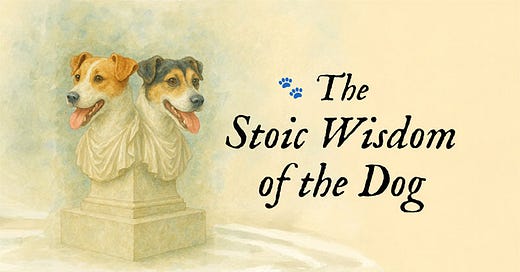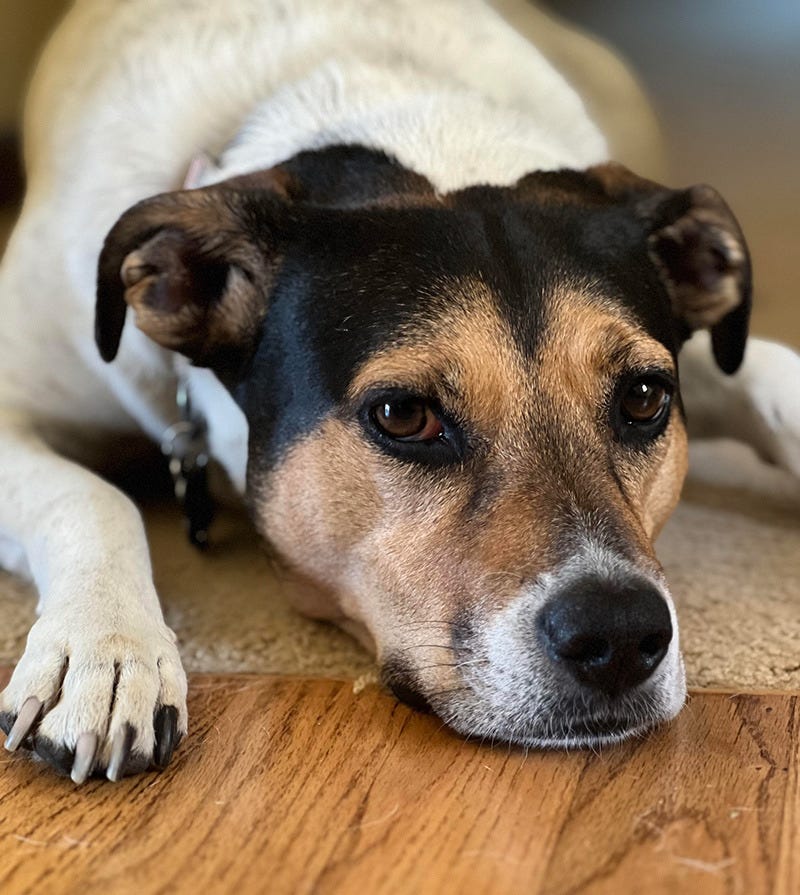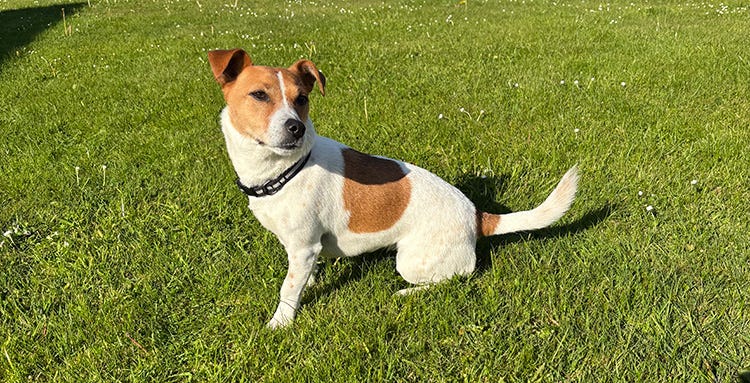(By Sam Alaimo and Allan John)
Since connecting on Substack, we (Sam and Allan) have realized that we share two big passions: dogs and philosophy. In this essay, we’re teaming up to share a few short personal stories that show just how much these two loves have shaped the way we each see the world.
Along the way, we hope to reveal some surprising connections between them, and maybe even offer a few lessons that can make life a little richer, whether you are or aren’t a dog guardian.
Introductions
Sam Alaimo and Carson
I write about hardship, ease, anthropology, war, Stoicism, existentialism, and dogs. Carson is my dog.
He is a mutt of unknown origin, but the truth is he is handsome. He is so handsome people will stop me to tell me how handsome he is, a fact I feel reflects positively on me as well. He is also my muse, the best conversationalist I have yet to find when it comes to the content of my essays, and the furry tube that makes every aspect of my life a flowing stream of 8K beauty.
—Sam
Allan John and Harley
The first philosopher I ever knew had four paws and an aversion to barking. My love of dogs began with Tiny, my grandparents’ Jack Russell Terrier. By the time I was old enough to appreciate her, she was old enough in dog years to have earned easy days. She was relaxing into retirement. Jack Russells are known for their boundless energy. But Tiny had done her running.
Her favorite spot was the back of the couch, where she’d perch like a cat, silently watching the world go by. A rarity for her breed, she never barked. She wasn’t at the window to warn, just to watch. That, and to leave behind enough white hair to change the color of the furniture.
I’d emerge from visits looking like I’d barely survived a fur blizzard. I didn’t mind.
Tiny also claimed the bed (sleeping for hours under the duvet), the car (lying on my grandfather’s lap while he drove), and most importantly, the chair—my chair. If I so much as glanced at it, she’d be there, tail twitching, ready to curl under my arm and gift me a few licks in exchange for attention and an “I see you!”
In those quiet, fuzzy moments, I felt something I didn’t yet have the words for: presence. Dogs seem to perfect the art of being exactly where they are. It wasn’t until much later, through philosophy—particularly Stoicism—that I realized just how much dogs can teach us about living wisely.
These soul-nourishing times with Tiny convinced me, even as a child, that I’d one day have a Jack Russell of my own. And now I do.
Harley came into my life as a chaotic pup and has remained delightfully unpredictable. But in her stiller moments, she carries forward the quiet wisdom I once found in Tiny, the tranquil old canine lady.
In the essay ahead, I’ll share stories of what Harley has taught me about attention, resilience, and the philosophical spirit I believe dogs embody. And it isn’t just me who thinks that: The great Socrates even made the assertion that our furry friends are true philosophers.1
—Allan
We Cannot Control What Happens, Only How We Respond
[SAM] Sometimes I wake up holding Carson and savor every moment of the dawn inching its way through the windows. I take him outside into the yard, stop to soak up the sun on my skin, only to look back at Carson happily rolling on his back atop of a colossal pile of bear feces.
My mind shifts in an instant, as if of its own accord, from Zen-like peace with the world and unconditional love for Carson into a single emotion—anger.
When I regain consciousness a half-second later, I ask myself: Who authored this emotion? Who chose it? Why would I accept such a contradiction within myself and allow anger to quench, even for a second, my devotion to this descendent of wolves (he seems to think he is recently descended, but his heating blanket says otherwise) happily obeying his instincts?
[ALLAN] I thought I was ready. I’d devoured dog-training videos, skimmed articles on diet, behaviour, and exercise, and stocked my home with toys, treats, and puppy pads. I was convinced I’d done the prep work.
Then came the first week with Harley.
Prolonged barking at 1am, again at 3am, and again at 5am. Sleep came only in fitful bursts. My floors became magnets for pee, poop, and sick. My hands, tasty targets for needle-sharp teeth.
I found myself asking my bleary-eyed reflection: What have I done?
In hindsight, I’d expected too much from a creature barely old enough to regulate her bladder. That mismatch—between expectation and reality—bred frustration.
But amid the chaos, Harley reminded me why I’d taken the leap.
After each mess, I’d sigh, clean up, and shoot her a look of disapproval. Every time, she’d meet me with wagging excitement—her whole back end vibrating with joy.
And I’d remember: she wasn’t being disobedient. She was being a puppy. She trusted me already. It was on me to meet her where she was.
We expect so much from these tiny beings. We bark commands and get frustrated when they don’t "get it"—forgetting we haven't shown them how.
With Harley, I had to stop reacting and start reflecting. If I hadn’t tried to see the world from her point of view, how could I expect her to follow rules she couldn’t understand?
As the canine behaviorist John Fisher said: to train a dog, you must think dog.
That shift—leading with patience and empathy—has changed how I respond to dogs.
And, just as importantly, to humans too.
We Must Teach and Tolerate
Epictetus said, “Is it possible to be free from fault altogether? No, that cannot be achieved, but it is possible ever to be intent upon avoiding faults.”2 It is a war of attention; of self-command; of governing our own minds to live as sane men and women, and to treat those we care for as they deserve to be treated. It is a good fight.
From the Stoic Roman emperor Marcus Aurelius, we have the following rule of thumb for human interactions that we can just as easily apply to the training of a dog: “If he’s making a mistake, instruct him in a kindly fashion and show him what he’s overlooking. If you can’t do that, blame yourself—or no one, not even yourself.”3 Mistakes are natural. The rational response is to teach better or tolerate.
The Present Moment is All We Have
[SAM] Carson and I like to hike at a state park near our home. We have seen more than a few seasons by this point. Leaves turn to gold; trails harden beneath snow and ice; rain brings blossoms of thistle and red oak; and on it goes as the earth orbits round the sun.
All the while, Carson’s pace has slowly changed from zoomified sprints and sliding one-hundred-eighty degree turns to a steady and conservative trot. What will the next tranche of golden leaves bring? Might his trot slow to a walk? What can I do about this if not learn the future is an if, and to therefore be grateful for the moment?
It is no longer possible for me to walk with him and feel upset about anything—work, tasks, worries—when I can see his paw prints in the mud, how happily he plunges into the sixty degree lake on a ninety degree day, and his deep and undisturbed sleep when we finally make it home.
[ALLAN] Harley is always there. When I go upstairs to my desk, she’s right behind me. Later, I’ll glance up from my work and spot her snoozing on one of her three beds squeezed into my makeshift “office.” Sometimes she’s sitting on the toy-strewn floor, watching me with quiet patience. Other times, she’s under the desk, gently nudging my leg, as if to say, Hey, remember me?
When I go downstairs, she’s there. I sit down and put my legs up. She appears on the footstool and makes herself comfortable between my feet. If I leave the room, she pads after me, nosing open doors to make sure I haven’t wandered too far.
On walks, I can let her off her lead and know that while she’ll race ahead to explore the sights and smells, she’ll keep looking back to make sure I’m still there. I always am.
Each little act of accompaniment, each tail-thumping call for attention from Harley, is a reminder. Her way of telling me that now is what matters.
When I watch her sleep, stop working to play tug-of-war, or simply enjoy her enjoyment of the outdoors, I’m fully inhabiting the present. I’m learning the lesson from her that this moment is all either of us have.
Harley is always there—for now. And I know—one day, she won’t be. Neither will I. Until such times, we make the most of each moment.
Live Now, Because Life is Short
Epictetus will ask us from two-thousand years ago, “Is not the future outside the sphere of the moral purpose at this moment?”4 Indeed it is. What, then, is under our control? What does exist? Our furry, four-legged animals at our sides exist, at this precise moment in time, and this is not only enough—it is all that matters.
The shortness of life, if we remain aware of it, encourages us to notice nice moments while we can. The British poet Lord Byron’s dog lived for just five years, but made an impression strong enough to warrant the following inscription on his tomb (which incidentally is larger than Byron's):
Near this Spot
are deposited the Remains of one
who possessed Beauty without Vanity,
Strength without Insolence,
Courage without Ferosity,
and all the virtues of Man without his Vices.
This praise, which would be unmeaning Flattery
if inscribed over human Ashes,
is but a just tribute to the Memory of
Boatswain, a Dog
who was born in Newfoundland May 1803
and died at Newstead November 18th 1808.
The Power of Stoic Acceptance
[SAM] Carson tore his CCL (dog version of ACL). We brought him to the animal hospital for surgery and had to leave him there for the day and night. We knew it was a standard procedure and yet we both felt a heavy weight settling in our stomachs.
The last time Carson had anaesthesia he nearly died when his intestinal tract collapsed. And so we looked down at Carson and Carson looked up at us on the chemically smelling floor of the hospital. He looked as if we were sending him into Mordor. Alone. Unarmed. He trembled, placed his ears into their “I am uncertain and sad” position, and leaned against our legs when the vet technician came. But he understood.
When we knelt down to say our goodbyes as if he were truly about to venture into the Black Land without us, he took command of his fate and walked (with treats) to his doom. He took his fate with more courage and calm than we did.
[ALLAN] Harley has never cared much for chasing a ball — it’s stones she loves. The moment I so much as pretend to pick one up, she springs into a ready crouch, eyes locked on me, muscles tensed to chase.
It was after a long walk along a rocky trail — when many stones were thrown and retrieved — that Harley developed a limp. She wouldn’t put weight on her back right paw. She’d had a some minor injuries like this before, that had always cleared up with a few days rest. But this time, the discomfort seemed to persist.
Harley didn’t seem to care, however. She had no intention of letting it hold her back. Every morning she’d hop to the back door on three legs, tail wagging, ready to race outside as if nothing was wrong. When I grabbed my keys or laced up my shoes, she’d sit upright, willing me to take her with me. Her spirit was intact, even if her body needed time.
It took real discipline — hers and mine — to hold back. After a vet visit, a hefty bill, and a course of anti-inflammatory meds, Harley began to heal.
Finally, when the limp was gone, I took her to the beach. The soft sand and cool waves would be easier on her legs. She bounded through the surf without a hint of hesitation, plucking stones from the foamy water, tail wagging at full speed.
Her movement confirmed she was ready. Watching her, though, I realized: she had been ready all along. It was just her body that had to catch up.
The Resilience of Loving One’s Fate
Carson embodied the wisdom of Epictetus: “Do not seek for everything to happen as you wish it to happen, but wish for everything to happen as it actually does happen and your life will be serene.”5 He understand what was in his control and what was not, and he neither complained, nor blamed, nor cursed his fate. Our dogs are an example for us all.
The refusal to look backward, the rejection of the past as being what defines us, the extraction of joy from every living second, and the resilience to maintain these attitudes regardless of our present circumstances. That’s Stoic philosophy–and dog philosophy–in a nutshell.
Conclusions
[SAM] I firmly believe dogs are our perpetual reminders of just how elevated and pure the human soul can be—if we open our hearts and minds to them.
Carson has helped me see with my own eyes many of the lessons of Epictetus, and Epictetus has helped me understand what it means to be here now with Carson and therefore all those in my life I care for.
[ALLAN] Living with a dog has taught me more about what it means to live a virtuous life than I ever expected. I’ve seen real courage when Harley, who’s usually shy, suddenly steps up to protect my little nephews from bigger dogs (who, in truth, weren’t really posing a threat) on our walks.
I’ve come to understand justice through her unwavering loyalty to the people who treat her kindly—she gives back what she’s given. And there’s a kind of quiet wisdom in the way she responds to training, or how she somehow always finds the things I’ve tried to hide.
It’s in these small, everyday moments that I’ve come to see what the philosopher Sextus Empiricus once argued6, disagreeing with the Stoics: that dogs, through their actions, show reason and virtue—maybe even more clearly than we do. And honestly, I think he might be right.
What life lessons have you learned from your animal companion?
Let us know in the comments!
Plato’s Republic, Book 2
Epictetus, Discourses 4.7.19
Marcus Aurelius, Meditations 10.4
Epictetus, Discourses 4.10.8
Epictetus, Enchiridion 8
Sextus Empiricus, Outlines of Pyrrhonism












"Besides love and sympathy, animals exhibit other qualities connected with the social instincts which in us would be called moral." -- Charles Darwin
"You know how to cut to the core of me, Baxter. You're so wise. Like a miniature Buddha, covered with hair." -- Ron Burgundy
https://youtu.be/A01NTgZLmlg